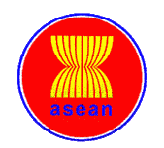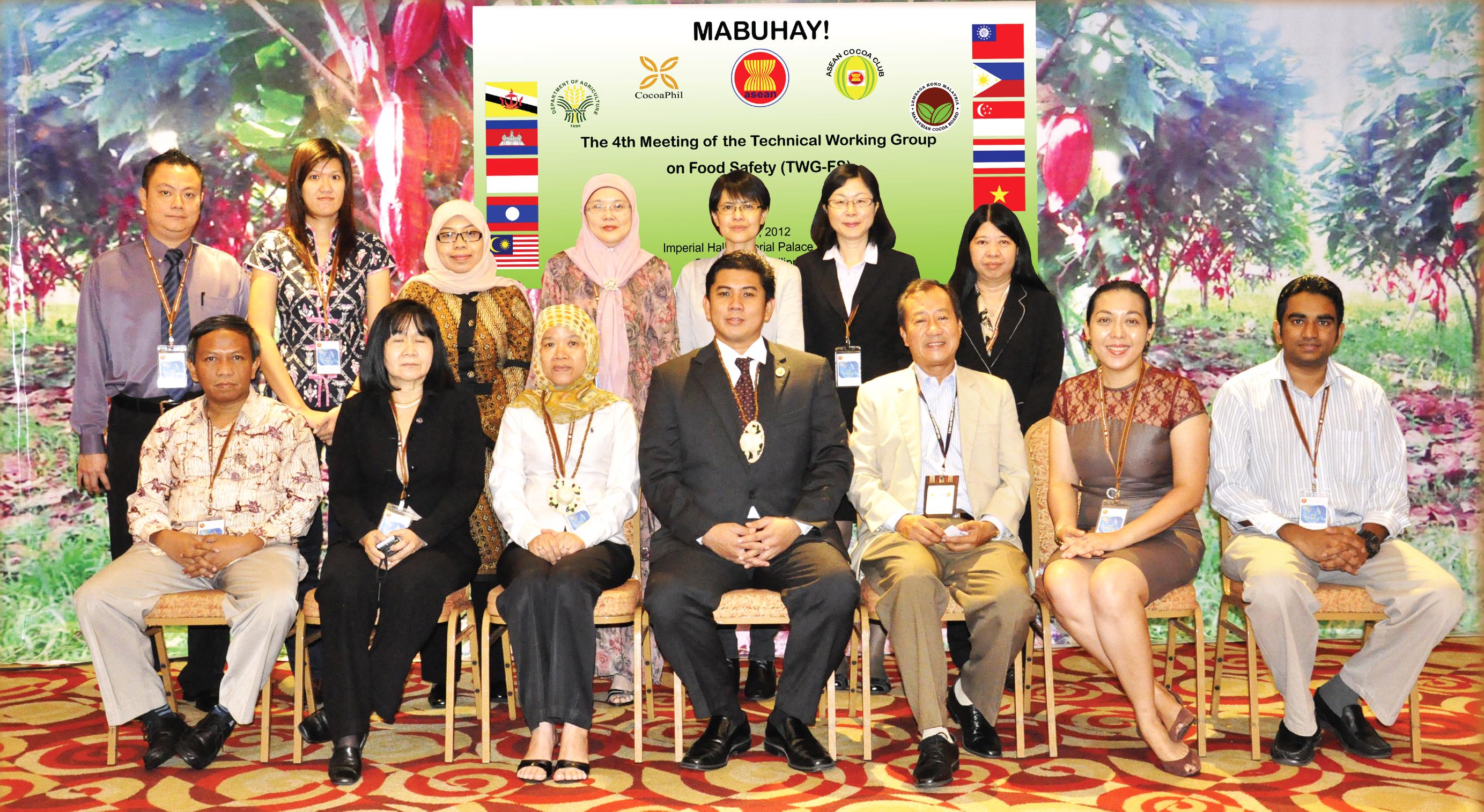

REPORT OF THE FOURTH MEETING OF THE ASEAN COCOA CLUB
TECHNICAL WORKING GROUP ON FOOD SAFETY (ACC TWGFS)
29th May 2012
Imperial Palace Suites, Quezon City, Philippines

INTRODUCTION
- The Fourth Meeting of the ASEAN Cocoa Club Technical Working Group on Food Safety (ACC TWGFS) was held on 29th May 2012 in Imperial Palace Suites, Quezon City, Philippines.
- The Meeting was attended by 17 ACC TWGFS members and observers from Indonesia, Malaysia, Philippines, Singapore and Thailand. The ASEAN Cocoa Club (ACC) Secretariat was also in attendance. The list of delegates appears as Annex I.
WELCOMING REMARKS
- The Meeting was officially opened by Engr. Leandro H. Gazmin, Director, Agribusiness and Marketing Assistance Service, Department of Agriculture, Philippines. He extended a warm welcome to all delegates from the ASEAN Member Countries to the 4th Meeting of the ACC TWGFS. He wished all the delegates a fruitful meeting and a wonderful stay in Philippines. The full text of his speech appears as Annex II.
AGENDA ITEM 1: OPENING REMARKS
- The Chairperson of the ACC TWGFS, Dr. Sabariah Samsudin, Director of Chemistry and Technology Division, Malaysian Cocoa Board (MCB) expressed her gratitude and appreciation to the Philippines for hosting the 4th Meeting of the ACC TWGFS.
- She also welcomed and thanked the delegates from Indonesia, Malaysia, Singapore and Thailand for attending the Meeting.
- In her opening remarks, she highlighted a close cooperation among the ASEAN Member Countries is of paramount importance in achieving the defined work plan of the ACC TWGFS. The full text of her speech appears as Annex III.
AGENDA ITEM 2: ELECTION OF VICE-CHAIRMAN
- Ms. Karen Kristine A. Roscom, Chief Science Research Specialist, Bureau of Agriculture and Fisheries Product Standards (BAFPS), Department of Agriculture (DA), Philippines was unanimously elected as the Vice-Chairman of the 4th Meeting of the ACC TWGFS.
AGENDA ITEM 3: ADOPTION OF AGENDA
- The Meeting adopted the Agenda for the 4th Meeting of the ACC TWGFS as appears in Annex IV.
AGENDA ITEM 4: BUSINESS ARRANGEMENTS
- The Meeting was held in plenary.
AGENDA ITEM 5: REPORT ON THE CURRENT STATUS OF THE COUNTRY’S INITIATIVES RELATIVE TO FOOD SAFETY ON COCOA AND COCOA PRODUCTS AND RELATED ACTIVITIES
- Indonesia reported that it will continue to monitor the pesticide residues in cocoa such as cypermethrin and deltamethrin in several cocoa bean production centers.
- Indonesia expressed concern on the amendment of maximum levels (MLs) for cadmium under the Commission Regulation (EC) No 1881/2006 that will be applied for all cocoa and cocoa products.
- Indonesia also reported that the maximum level (ML) of cadmium for cocoa butter is 0.5 mg/kg as indicated in Standard Nasional Indonesia (SNI) 3748:2009.
- Indonesia also informed that the SNI 3747:2009 for cocoa powder was imposed last October 2010 with the ML for cadmium is 1.0 mg/kg similar to the cocoa beans as indicated in SNI 7387:2009 (Batas Maksimum Cemaran Logam Berat Dalam Pangan).
- Malaysia informed the Meeting that it is in the process of drafting the Malaysian Standard (MS) for Chocolate and Chocolate Products-Sampling and Test Methods.
- Philippines reported on the five (5) major food safety initiatives of the Philippines on cocoa beans and cocoa products since the 3rd Meeting of the ACC TWGFS in Bangkok, 9th May 2011 as follow:
- The Code of Practice for Philippine Cacao Beans which was completed in 2011;
- The ongoing Pilot Testing of a Traceability System for Philippine Cacao Beans;
- The Code of Practice for Philippine Tablea;
- The Philippine National Standard for Philippine Tablea; and
- Additional recent activity on monitoring of Ochratoxin A in Philippine cocoa beans and cocoa products
- The full report appears in Annex V.
- Singapore informed that their current regulation for cadmium is 0.2 mg/kg for all food articles.
- Thailand informed that it has the Code of Practice for Agricultural Products which include food safety, heavy metals and Good Manufacturing Practices (GMP) but not specific on cocoa.
AGENDA ITEM 6: STATUS REPORT ON THE FOOD SAFETY REQUIREMENTS IMPOSED BY IMPORTING COUNTRIES
- Indonesia reported that Japan’s Ministry of Health, Labour and Welfare (MHLW) has released the Positive List System for Agricultural Chemical Residues in Foods in year 2006 and was updated on 5 February 2007.
- Indonesia also informed the Meeting on Regulation (EC) No. 396/2005 dated 23 February 2005 on the Maximum Residue Levels of Pesticides in or on Food and Feed of Plant and Animal Origin and amending Council Directive 91/414/EEC.
- Currently, Indonesia is conducting analysis of cadmium in cocoa beans from various regions in Indonesia and found that the cadmium levels are lower than the standard indicated in their SNI.
AGENDA 7: REPORT ON THE ISSUES OF IMPORTANCE RELATED TO FOOD SAFETY
- The Chairperson of the ACC TWGFS informed the Meeting that the 85th Regular Session of the International Cocoa Council Organization Meeting (ICCO) which was held last 27-30th March 2012 in Guayaquil, Ecuador noted the concerns of several producing countries regarding stringent European Union (EU) legislation on cadmium content in cocoa. The Council agreed to hold a workshop in London in May to address the issue. They also agreed to hold seminars in cocoa-producing countries on issues of importance to members; and to launch a working group on Food Safety, Cocoa Productivity and Quality.
- The Chairperson also informed the Meeting on the issue of cadmium in chocolate. The main ingredients in chocolate are cocoa, milk and fats, each of which is a potential source of cadmium. Cadmium is a heavy metal used in a variety of application such as steel plating, as a pigment in plastics and glasses and in the production of batteries. These industrial activities are the main routes through which cadmium is released into the environment. It accumulates in the water and soil and subsequently in plants and animals. The EU limit proposal for cadmium is 0.5 mg/kg.
- The Meeting agreed to the proposal from Philippines to develop an ASEAN Code of Practice for the reduction of Ochratoxin A (OTA) in cocoa beans, taking into consideration the common production practices in the region. It was also agreed that the Code of Practice for the reduction of OTA in coffee developed by Indonesia and Thailand will be used as reference.
- Singapore inquired whether the ASEAN Member Countries (AMC) have encountered the issue of mercury in the cocoa and cocoa products. No AMC have reported on that issue.
AGENDA 8: STATUS REPORT ON THE DEVELOPMENT OF DATABASE ON FOOD SAFETY
- The Secretariat of ACC TWGFS informed the Meeting that Philippines had provided the nominee of person in-charge for the database and technical member of ACC TWGFS on 29th June 2011 including the replacement of Director Gilberto Layese who has retired last year with Ms. Karen Kristine Roscom.
- The AMC were requested to provide uniform resource locator (URL) address of hyperlink to the member countries relevant food safety website to the Secretariat of ACC TWGFS immediately. The hyperlinked food safety website for the AMC is utmost important in facilitating the AMC to source the requirements pertaining to food safety of cocoa and cocoa products.
- Malaysia updated the profile of pesticide residues for acephate, chlorothalonil, chlorpyrifos, dimethoate, endosulphan and quinalphos for cocoa beans; and heavy metals for cadmium and lead in cocoa beans.
- Philippines will upload the standard for heavy metals this year and requested that additional list of active ingredients for the pesticide residues could be uploaded into the database.
- Indonesia and Thailand will update the data for pesticide residues into the database.
- The Chairperson seeks cooperation and commitment from AMC to update the information in database prior to next Meeting.
AGENDA 9: KNOWLEDGE AND EXPERTISE SHARING ON TESTING METHODOLOGIES
- Philippines inquired with the AMC on a validated method of testing OTA in cocoa beans and products. Singapore suggested the assistance from Nestle, Singapore.
- Indonesia and Thailand informed the Meeting that they are using High Performance Liquid Chromatography (HPLC) for the testing of OTA in cocoa and coffee beans.
AGENDA 10: HARMONIZATION ON THE FOOD SAFETY REQUIREMENTS OF THE ASEAN MEMBER COUNTRIES
- The Chairperson informed the Meeting on the work progress done by ASEAN Consultative Committee on Standard and Quality-Prepared Foodstuff Product Working Group (ACCSQ-PFPWG) on the following:
- Harmonization of food additives and food contaminants for category 5.2: Confectionery including hard and soft candy, nougats, etc. under The Taskforce on Harmonization of Prepared Foodstuff Standard;
- ASEAN Common Principles and Requirements for Food Hygiene;
- ASEAN Common Principles and Requirements for the Labeling of Prepackaged Food;
- The ASEAN Common Requirements for Food Control Systems;
- Guidance for Harmonised Import-Export Inspection and Certification Systems; and
- Guideline for ASEAN Audit and Certification of Food Hygiene and Hazard Analysis and Critical Control Point (HACCP).
The details can be accessed at www.aseanfoodsafety.network.net.
- The Meeting agreed to establish an electronic Working Group (e-WG) to develop the ASEAN Code of Practice for the reduction of Ochratoxin A (OTA) in cocoa beans which will be led by Philippines, with Indonesia and Thailand as members of the e-WG.
- The Meeting will coordinate closely with the Technical Working Group on Good Agricultural Practices (TWG GAP) to avoid duplication of work.
AGENDA 11: Other Matters
- The Meeting was informed on the change of membership for Singapore. Mr. Jayaprakash Jayachandran is replacing Mr. Yong Lee Keng as the technical member of the ACC TWGFS.
- The AMC were requested to inform the Secretariat on any changes of their membership.
- The Meeting updated the ACC TWGFS work plan for the year 2012-2015 as it appears in Annex VI.
- The Meeting agreed to have once a year physical meeting back to back with the ACC Meeting.
AGENDA 12: ADOPTION OF THE REPORT
- The Meeting unanimously adopted the Report of the Fourth Meeting of the ASEAN Cocoa Club Technical Working Group on Food Safety (ACC TWGFS) held on 29th May 2012 in the Imperial Palace Suites, Quezon City, Philippines.
ACKNOWLEDGEMENT
- The Chairperson of the ACC TWGFS expressed her gratitude and thanks to all delegates for their active participation in the Meeting.
- The delegation of Indonesia, Malaysia, Singapore and Thailand expressed their sincere appreciation to the government of Philippines in particular to the Department of Agriculture and Cocoa Foundation of the Philippines (CocoaPhil) for their hospitality accorded to them and the excellent arrangements made for the Meeting. The Meeting also thanked the ACC Secretariat for the assistance and support provided.
- The Meeting was held in the traditional spirit of ASEAN cordiality and solidarity.
Quezon City, Philippines
29th May 2012
Click here to download PDF format